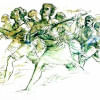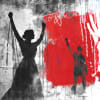Honour or insult for martyrs?
BNP policymaker Nazrul Islam Khan's announcement that his party would prepare a list of martyrs of our Liberation War in 1971 appeared as a retaliatory step which brought out once again the party's long held dubious stance over the spirit of the Liberation War.
His party has always been cosy with anti-liberation leaders and forces. On the one hand, it boasts of the party founder General Ziaur Rahman's role in 1971. On the other hand, it has been maintaining ties with anti-liberation elements and rehabilitating them in the post-1975 politics.
The BNP leader's announcement seems to be an electoral pledge as he said his party would make the list if voted to power.
The BNP-led by Gen Ziaur Rahman, Justice Abdus Sattar and Khaleda Zia was in power for five times and governed the country for one and a half decades. BNP never spoke about preparing such a list during their periods in power. Rather, previous BNP-led governments always recognised and defended the historic fact regarding killing of 30 lakh Bangalis in 1971 by Pakistani occupation army and their collaborators.
The party's pledge for preparing the list came only after BNP Chairperson Khaleda Zia was sued for sedition recently by a lawyer with the government's permission for making derogatory remarks by questioning the number of martyrs in the Liberation War.
This pledge, which the BNP leader made at a programme organised to protest the sedition case against Khaleda, therefore, is nothing but an outrageous reaction to the government's actions against Khaleda Zia.
Before Nazrul, a member of BNP national standing committee, BNP senior leader Gayeshwar Chandra Roy, had demanded that the government publish names of all 30 lakh martyrs of the Liberation War.
But the BNP leaders' pledge and demand are not consistent with the international practice of estimating the numbers killed in genocide.
War crime researchers say no country has prepared such a list in over 5000 years of history. A government's official version and record of death tolls are always considered international practice to determine the number of victims of genocide.
They say there is a huge risk in preparing such a list. If a single name is left out, the credibility of the entire list can be questioned.
Even after World War II, European countries did not take any initiatives to prepare any list of their citizens killed in the war.
The question then arises as to how the BNP, if it comes to power, would prepare this list? Is it possible after 44 years to trace everyone who was killed in 1971?
The BNP's move, if it is taken in such a case, creates a risk of sparking a huge controversy diverting focus from the magnitude of the genocide to the controversy of the number of martyrs. If so, this will serve Pakistan well, the country that carried out the genocide but keeps denying the atrocities of 1971 let alone apologise for the crimes.
Nazrul Islam Khan says the necessity for preparing such a list is to "honour martyrs properly."
The BNP's track records however show something different.
Dishonoring the martyrs and the spirit of the Liberation War started from General Zia and is being continued by his wife Khaleda Zia. They have been rehabilitating anti-liberation leader and forces in politics for a long time.
Zia, who grabbed state power in an extra-constitutional way, made the anti-liberation leader Shah Azizur Rahman a minister in 1978 and the prime minister the following year.
Shah Aziz was again made prime minister by Justice Abdus Sattar-led BNP government in 1981.
Gen Zia, who became the chief martial law administrator and later took the office of the president, had relied on the anti-liberation forces to consolidate his political power base.
He made Abdul Alim a minister in 1978. A war crimes tribunal in 2013 convicted Alim of crimes against humanity.
Anti-liberation leader Abdur Rahman Biswas can be considered more fortunate than many others. He was made a minister by Gen Zia in 1979. The Khaleda-led BNP in 1991 elected Biswas the parliament's speaker and later the country's president.
His wife, Khaleda Zia followed Zia's footstep. She appointed Jamaat-e-Islami leader Matiur Rahman Nizami and Ali Ahsan Mohammad Mojaheed ministers of her government 2001. Both Nizami and Mojaheed were convicted of war crimes. Mojaheed has already been executed.
She also made another war criminal Salauddin Quader Chowdhury her parliamentary affairs advisor in 2001 with the status of a minister. Salahuddin has also been convicted on charges of war crimes and executed along with Mojaheed in November last.
In the verdict against Nizami, the International Crimes Tribunal-1 in 2014 strongly denounced the appointment of the anti-liberation leader as minister in Khaleda Zia's cabinet in 2001.
The appointment was a great blunder, said the court, a clear slap in the face of the Liberation War as well as the three million martyrs and the two lakh women who were raped in the war.
Jamaat, the major anti-liberation force, is still a key ally of the BNP of Khaleda Zia. And she keeps close with Jamaat despite strong criticism from her party leaders and outside.
If BNP won the next election with its ties with Jamaat intact then it would form an alliance government again like in 2001. What will be the role of Jamaat in that case in preparing the list of martyrs? Will Jamaat, a political party accused of killing unarmed civilians including intellectuals and assisting Pakistani army to carry out genocide, advice the government how to prepare the list?
If that happens, it will be another slap in the face of the Liberation War as well as the three million martyrs. It would not be honouring the martyrs.

 For all latest news, follow The Daily Star's Google News channel.
For all latest news, follow The Daily Star's Google News channel. 








Comments